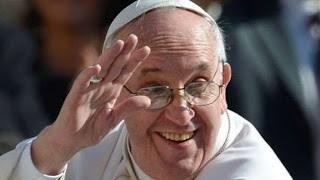Prominent Jesuit: Pope Francis’s first major issuance ‘almost a direct refutation’ of the GOP
Pope Francis’s first major publication can be read as an attack on the Republican philosophy of low taxes for the wealthy and reduced support of welfare programs, according to a prominent Jesuit professor.
During a panel discussion at Georgetown University last month, American Jesuit and Boston College professor David Hollenbach was asked how the faithful should engage with the poor in light of Pope Francis’s apostolic exhortation Evangelii Gaudium.
“I think there are multiple dimensions,” Hollenbach replied. “One of course is to find ways to help people who are members of the Church find a way to be in contact, become friends with those who are poor — an experiential dimension. That’s very important. But I don’t myself think that is going to solve the whole problem, because I don’t think it is going to be — as much as the document says it is the responsibility of every Christian to become friends with the poor, I don’t think it is actually likely to happen very much, or at least to happen as much as it’s needed.”
Christians also needed to examine the structure of society, and how political institutions treated the least among us, he added.
“There is an enormous amount of interesting material in this document [the Evangelii Gaudium], not focused as the central spotlight of the document, but… this document deals with solidarity and its relationship to subsidiarity. I mean, in a certain way that could be written almost as a direct refutation of the recent Republican budget proposal of a year ago. It is a direct challenge to some of the fundamental arguments that are being made in the United States Congress about structures.”
The pontiff released his Evangelii Gaudium, or Joy of the Gospel, last year. The 224-page document called for a “return of economics and finance to an ethical approach which favours human beings.”
“As long as the problems of the poor are not radically resolved by rejecting the absolute autonomy of markets and financial speculation and by attacking the structural causes of inequality, no solution will be found for the world’s problems or, for that matter, to any problems,” Pope Francis wrote in the first major document to reflect his own vision for the Catholic Church.
The pope also attacked the theory of supply-side economics, which holds that reducing taxes on the wealthy helps everyone by increasing capital investment and consequently increasing job growth. The theory was advocated most prominently by President Ronald Reagan.
“Some people continue to defend trickle-down theories which assume that economic growth, encouraged by a free market, will inevitably succeed in bringing about greater justice and inclusiveness in the world,” the pope said. “This opinion, which has never been confirmed by the facts, expresses a crude and naïve trust in the goodness of those wielding economic power and in the sacralized workings of the prevailing economic system.”
Hollenbach noted that Catholics had talked about altering the structure of society before, citing “Economic Justice for All,” a pastoral letter published by the United States Conference of Catholic Bishops in 1986. But the calls for economic reform fell on deaf ears.
“People said, ‘Oh, I really agree with the part about the Bible, but I don’t buy all that stuff they said about the market,’” he explained. “And they wrote it all off.”







0 comments:
Post a Comment